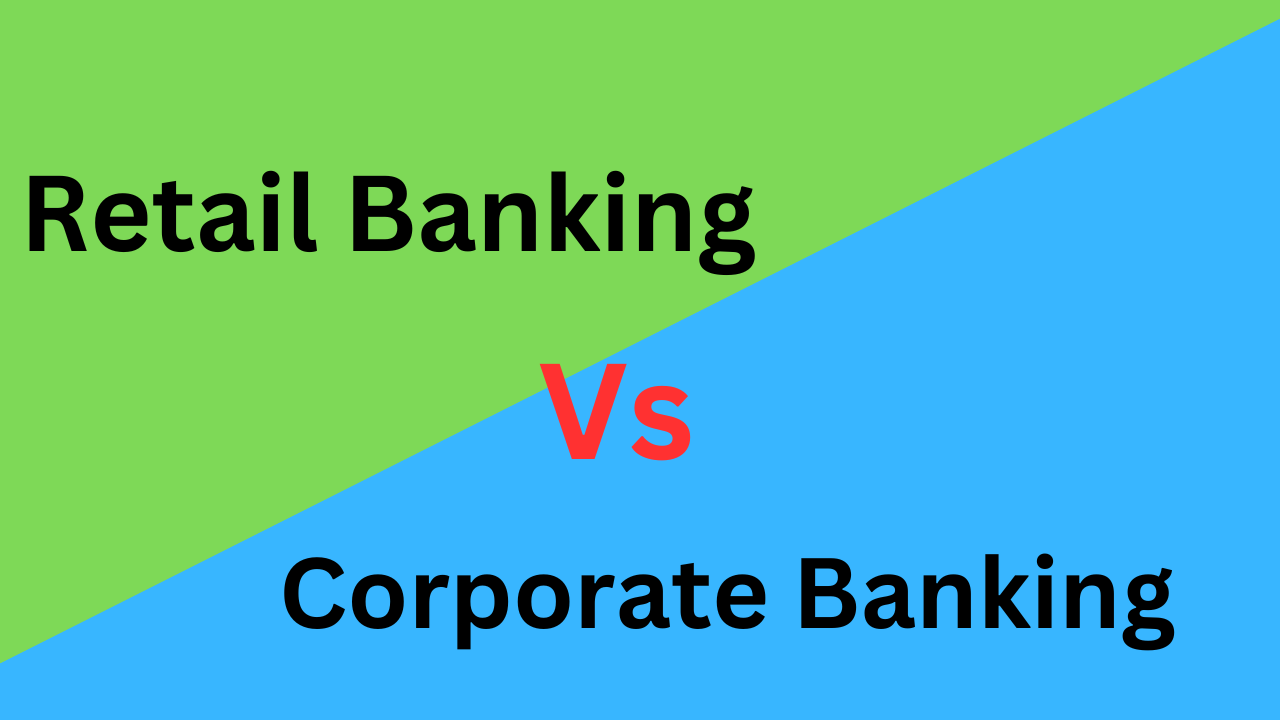What is the main difference between retail banking and corporate banking? The former offer banking services that deal directly with consumers while the latter is part of the banking industry that serves the corporate or business customers.
Banking is a broad concept that entails different types of services. Retail and corporate banking are among the main branches of banking industry that cater for different purposes. Knowing the retail and corporate banking meaning is vital.
We wrote this detailed blog post to help you tell the differences between corporate banking and retail banking with examples. Take the time to read through this difference between retail banking and corporate banking in tabular form.

Difference Between Retail Banking and Corporate Banking With Table
| Basic Terms | Retail Banking | Corporate Banking |
| Meaning | It is a banking unit that provide basic services to retail customers. | It is a banking unit that handle large corporate clients by providing specialized services. |
| Clientele | Individuals | Small to medium-size companies and enterprises. |
| Products | Standardized | Tailored-made |
| Processing Costs | Low | Comparatively high |
| Transactions | Low transaction value | High transaction value |
| Loan Size | Up to 5 Crores | More than 5 Crores |
| Customer Support | Banks that offer these services have an ordinary or modest relationship with their customers. | Banks that offer such services maintain excellent, high-level relationships with their customers. |
| Risk Associated By | Less risky | Riskier |
| Alternative Names | Consumer banking or Personal banking | Business banking |
| Profitability | Less | Relatively more |
What Is Retail Banking?
Retail banking refers to the financial services and transactions offered by banks to individual consumers. It involves a range of services aimed at satisfying the personal banking needs of customers.
This includes basic services such as savings and checking accounts, personal loans, mortgages, credit cards, and certificates of deposit. It also focuses on providing accessible and convenient banking solutions for everyday individuals through savings and loans.
Retail banks operate through physical branches, online platforms, and mobile apps to offer a wide array of financial products and services. They also facilitate ATM access, online banking, and customer support for tasks like account inquiries and fund transfers.
What Is Corporate Banking?
Corporate banking refers to a division within a bank that provides specialized financial services and solutions to large corporations, businesses, and other institutions. Corporate banking is tailored to the complex financial needs of businesses.
Corporate banking services include a wide range of offerings such as commercial loans, trade finance, cash management, treasury services, and investment banking. These services help businesses manage their working capital, optimize cash flow, handle international transactions, and access capital for expansion and investments.
Corporate banks also offer advisory services related to mergers and acquisitions, capital raising, risk management, and strategic financial planning. The relationship between a corporate bank and its clients often involves a deep understanding of the client’s industry and financial situation, leading to tailored solutions that address specific business challenges.
Corporate banking plays a crucial role in supporting the financial growth and stability of businesses by providing them with the tools and expertise needed to navigate the complexities of the business world.
Main Difference Between Retail Banking and Corporate Banking
- Retail Banking is a strategy banks use to attract a broad customer base by offering various products to individuals and small businesses. In contrast, Corporate Banking is a strategy focused on generating high revenue by catering to business enterprises and government agencies.
- Retail banking provides standardized off-the-shelf products, while corporate banking offers customized solutions based on client preferences. Retail banking captures a large customer base, whereas corporate banking serves fewer affluent clients.
- Retail banking has lower processing costs, and loans are typically limited to Rs. 5 crores. Corporate banking involves higher processing costs and offers loans exceeding Rs. 5 crores.
- While retail banking sees high transaction volume but lower transaction value due to its diverse customer base, corporate banking has fewer transactions but higher values, serving businesses and high net worth individuals.
- Corporate banking is generally more profitable than the retail banking division of banks.
- Corporate banking’s profitability is often superior to that of retail banking due to its specialized focus on larger transactions and tailored solutions. This is because corporate banking deals with intricate financial needs of businesses, including complex financing structures and strategic advisory services.
- Retail banking, on the other hand, prioritizes convenience and accessibility for a wide range of customers, providing basic banking services to meet every day needs. While it may have lower individual transaction values, the cumulative volume of transactions contributes to its overall revenue.
Similarities Between Retail Banking and Corporate Banking
- Both offer financial services through banks.
- Both involve lending and credit services.
- Both manage customer accounts and transactions.
- Both provide access to digital banking platforms.
- Both contribute to a bank’s overall revenue.
- Both involve risk assessment and management.
- Both play a role in supporting economic activities.
Final Thoughts from Experts
The distinction between retail banking and corporate banking lies in their target clientele, scope of services, and revenue models. Retail banking is geared towards serving individuals and small businesses with standardized, off-the-shelf financial products.
Corporate banking caters to larger businesses, providing customized financial solutions to meet complex needs. It operates with a narrower client base but tends to generate higher-value transactions that leads to a more profitable revenue stream.
People Who Read This Also Read:
- Difference Between Pre-Shipment and Post-Shipment Finance
- Difference Between Time Study and Motion Study (With Table)
- Difference Between Domestic Business and International Business (With Table)
- Difference Between Traditional Commerce and E-Commerce (With Table)